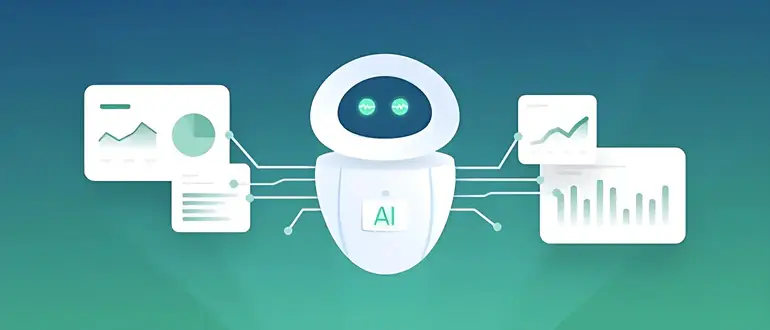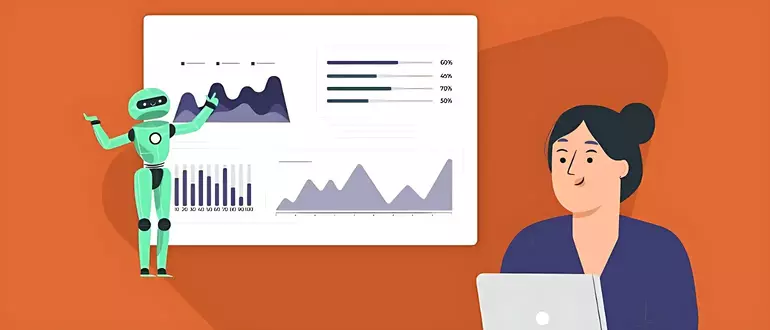
AI (artificial intelligence) is changing many businesses and changing the way we work. Data mining is one area where AI is having an effect.
Many people wonder if AI will replace data analysts because it can quickly and correctly look at a lot of data.
This blog post will analyze how AI may affect data analysts, and the impact of AI in the data analyst job industry, opportunities, and recommended skills for data analysts in the era of AI.
Will AI Replace Data Analysts?
No, AI won’t replace data scientists. Instead, it will help them do their jobs better and save money.
Think of it as a partnership: AI will do the hard lifting of processing and analytics, but humans will still be needed to interpret results and make sure they are correct.
As the amount of data keeps growing, the need for data analysts will only grow, but their job may change to using AI skills.
So don’t worry; AI is here to help, not take over!
What is the Probability of AI Replacing Data Analysts?

The probability of AI replacing data analysts is a topic of discussion in the tech industry.
While some experts predict that AI could displace certain aspects of data analysis, others argue that AI will only augment the work of data analysts.
What the Studies Show
The impact of AI on the job market may not be as drastic as some fear.
In fact, only around 20% of existing UK jobs may actually be displaced by AI and related technologies over the next 20 years, rising to around 26% in China.
This means that while some jobs may be replaced, the overall impact may not be as severe as predicted.
The Role of AI in Data Analysis
It’s true that AI can automate certain aspects of data analysis, such as data cleansing and processing.
However, it lacks the creative problem-solving skills that humans possess.
This means that you, as a data analyst, will need to upskill and take on more complex tasks as automation speeds up the data analysis process.
The Benefits of AI in Data Analysis

AI can also democratize data across the business and make it easy for everyone to use, saving data analysts, scientists, engineers, and other data professionals time.
Gartner projects that “more than 40% of data science tasks will be automated by 2020, resulting in increased productivity and broader usage of data and analytics by citizen data scientists”.
The Importance of Internal Knowledge
While AI can assist in data analysis, it’s worth noting that the shortest pathway to successfully implementing AI is to start with a clear and tangible business problem.
After all, no one knows the business problems better than the people working in the organization every day.
Therefore, internal knowledge may remain essential to leverage AI’s capabilities in data analysis fully.
Verdict:
What’s the probability of AI replacing data analysts? It’s hard to say, but AI will definitely influence data research in the future.
As a data analyst, it’s important to upskill and adapt to this new landscape while leveraging your uniquely human skills to work alongside AI and achieve the best results.
What is the impact of AI on the Data Analyst Job?

Increased efficiency in data analysis:
AI tools can process huge amounts of data faster than people.
Instead of manually analyzing data, data analysts can now focus on more complex jobs like interpreting data and making informed choices.
Data processing and analysis have decreased due to this speed.
Enhanced accuracy:
AI tools examine data without bias or human error. Data analysts can now use AI to get accurate insights and predictions to make better choices. This accuracy boosts data research quality.
New job roles:
The advent of AI has led to the emergence of new job roles in the field of data analysis.
Data analysts can now specialize in areas such as data science, machine learning, and AI.
This has led to an increase in demand for individuals with these specialized skills.
Data security:
AI-powered tools can also be used to enhance data security. Data security has become a major concern with the increasing amount of data being processed and analyzed.
AI-powered tools can detect anomalies and potential threats in the data, which can then be addressed by data analysts.
Increased productivity:
AI-powered data analysis tools boost efficiency. Data analysts can now process and analyze more data faster. Increased efficiency has saved companies money.
What Skills Are Required for Data Analysts in the AI Age?

Here are some of the skills that are required for data analysts in the AI age.
Data Visualization and Communication
Data analysts must simplify complex data. This requires data visualization skills to make charts, graphs, and other visual aids to communicate your findings.
You should also be able to explain your findings to peers.
Programming Languages
To work with AI and machine learning, data analysts need to be proficient in programming languages like Python, R, and SQL.
These languages are used to manipulate and analyze data and build models that can help to predict future trends.
Data Mining and Cleaning
Data analysts need to be able to collect, clean, and transform data to make it usable for analysis.
This requires skills in data mining, which involves extracting data from various sources, and data cleaning, which involves removing errors and inconsistencies in the data.
Statistical Analysis
Data analysts need to have a strong foundation in statistics to be able to analyze data and make predictions.
This includes skills in regression analysis, hypothesis testing, and experimental design.
Machine Learning and AI
Data analysts must comprehend AI and machine learning as they become more common in business.
This involves understanding and applying machine learning algorithms, models, and techniques to real-world problems.
Domain Knowledge
Data analysts need to have domain knowledge in the field they are working in.
This means that they need to understand the business problems and challenges faced by their organization, as well as the industry trends and best practices.
The Top 5 AI Tools for Data Analysts
To succeed in this data-driven world, organizations need AI-powered data analysis tools.
- Tableau,
- Microsoft Power BI,
- TIBCO Spotfire,
- Qlik Sense
- and IBM Cognos Analytics are the five best
AI tools for data analysts. These tools help analysts comprehend and visualize their data.
Other Essential Skills for Data Analysts in the Age of AI
Gleaning insights from data is just one part of the data analysis process. Another fundamental part is telling a story with those insights to help inform better business decisions.
To stay competitive in the age of AI, data analysts need to have skills such as data management planning, research data archiving, metadata, and statistical visualization.
These skills enable them to interpret and present data in a way that is meaningful to stakeholders.
What are the Opportunities for data analysts in the age of AI?

Opportunities for Data Analysts in the Age of AI:
Developing and Managing AI Models
One of the most exciting opportunities for data analysts in the age of AI is developing and managing AI models.
AI is driving demand for model creators, implementers, and managers. Analyzing data and predicting trends with machine learning algorithms and other AI tools.
Data Visualization
Another area where data analysts can find opportunities in the age of AI is data visualization.
Big data generates massive volumes of data that can be hard to understand. Data analysts can help by creating visual representations of this data, making it easier for businesses to understand and act upon.
Data Security and Privacy
As businesses collect and store more data, there is a growing concern about data security and privacy.
Data analysts can play an important role in ensuring that businesses protect their data and comply with data privacy regulations.
This involves working with IT and security teams to develop protocols and systems for data protection.
Decision-Making
Data analysis improves company decisions. Data analysts can advise based on data analysis. AI allows data analysts to use machine learning algorithms to predict future trends and help businesses make better choices.
FAQs
Will AI Completely Replace Data Analysts In The Near Future?
While AI has the potential to automate many tasks currently performed by data analysts, it is unlikely to replace them completely.
Instead, data analysts will likely become managers of AI systems and use their creative problem-solving skills to interpret the results and provide valuable insights.
What Are The Limitations Of AI In Replacing Data Analysts?
While AI can process large amounts of data quickly and accurately, it lacks human insight and creative problem-solving skills.
AI systems may also have difficulty understanding the context of the data they are analyzing and may struggle with tasks that require intuition or decision-making based on subjective criteria.
Can AI Improve The Efficiency Of Data Analysis?
Yes, AI can improve the efficiency of data analysis by automating repetitive and time-consuming tasks such as data cleaning and processing.
This can allow data analysts to focus on more complex and creative tasks.
How Can Data Analysts Work Alongside AI Systems?
Data analysts can work alongside AI systems by using their expertise to interpret the results and provide insights.
They can also help to train AI systems by providing labeled data and feedback on the system’s performance.
Is There A Risk That AI Systems Will Make Data Analysts Redundant?
While AI systems may automate many tasks currently performed by data analysts, human expertise will still need to interpret the results and provide valuable insights.
Conclusion
AI technology is advancing quickly and may automate some data analysis tasks, but it won’t replace human data analysts anytime soon.
Data interpretation and strategic decision-making require human knowledge and critical thinking.
Instead, AI will likely serve as a valuable tool for enhancing the work of data analysts and improving overall efficiency in the field.





